外研版(2019)选择性必修第一册Unit 1 Laugh out loud Using language 课件 (共12张PPT)
文档属性
| 名称 | 外研版(2019)选择性必修第一册Unit 1 Laugh out loud Using language 课件 (共12张PPT) |  | |
| 格式 | zip | ||
| 文件大小 | 2.7MB | ||
| 资源类型 | 教案 | ||
| 版本资源 | 外研版(2019) | ||
| 科目 | 英语 | ||
| 更新时间 | 2022-08-26 18:39:44 | ||
图片预览

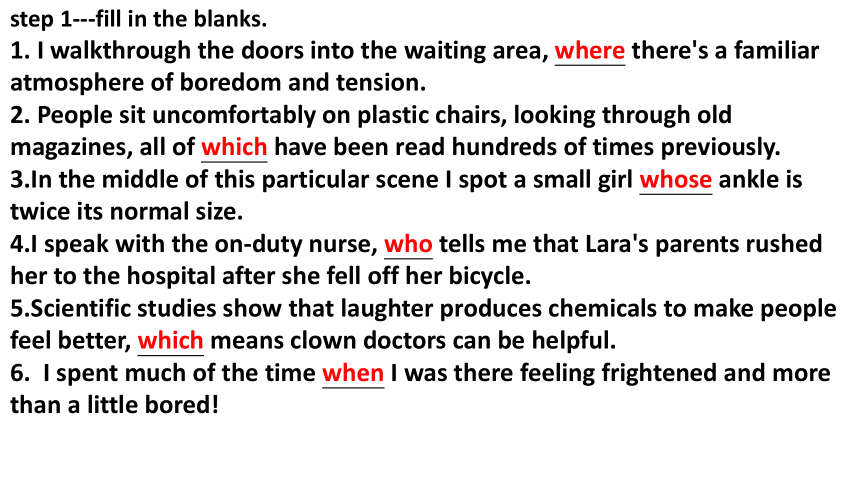
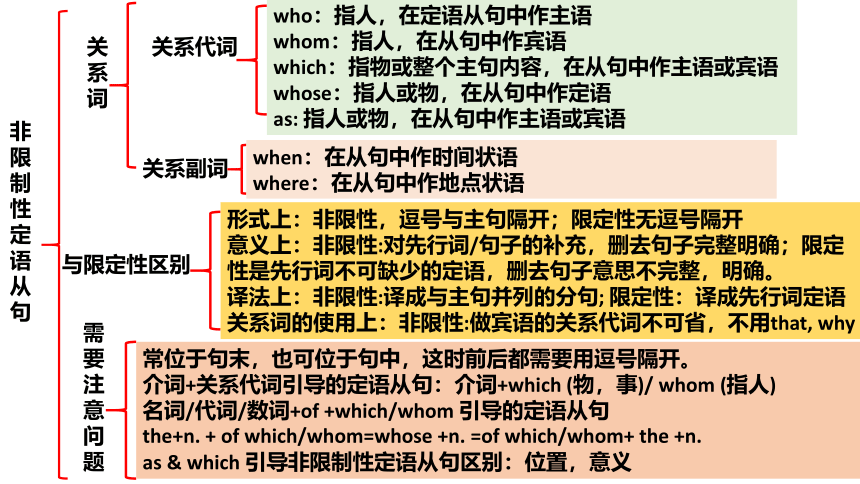
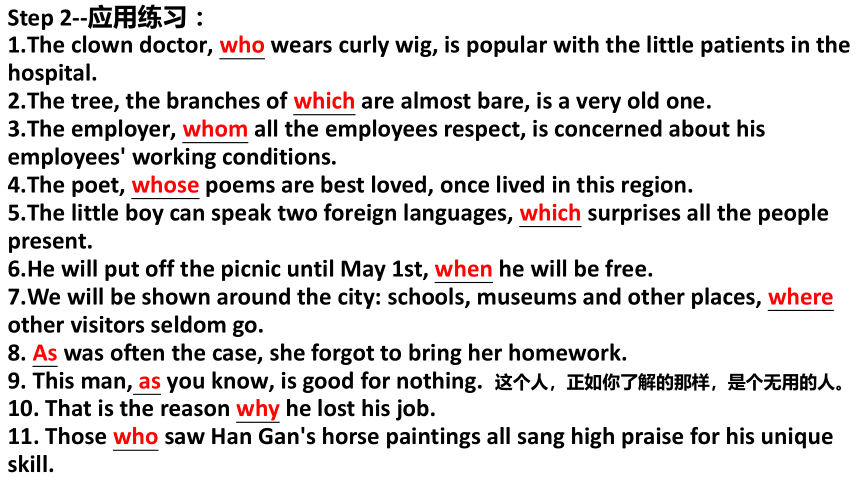
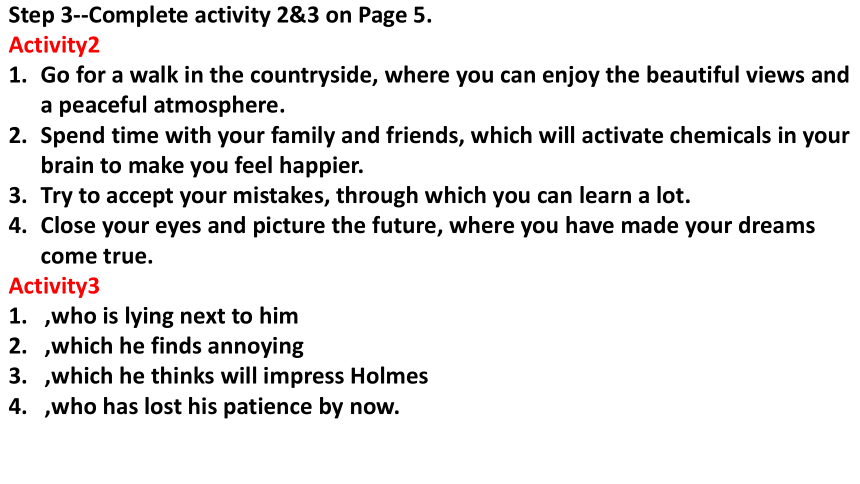
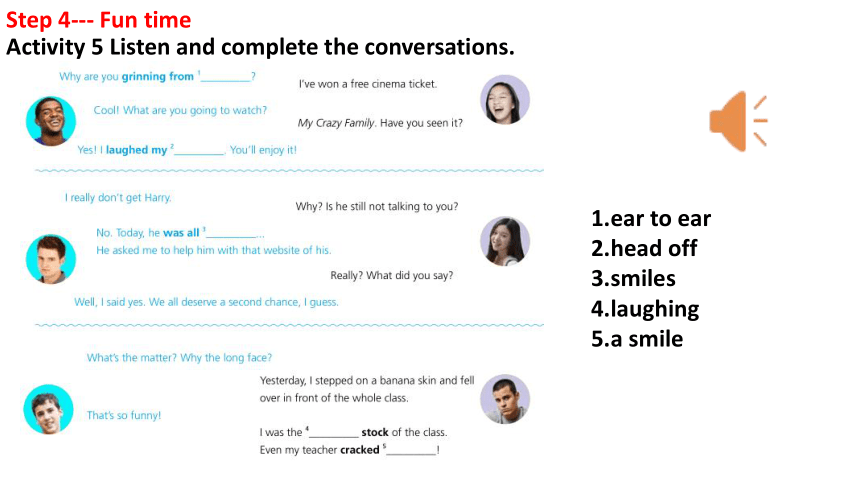
文档简介
(共12张PPT)
Unit 1 Laugh out loud
第二课时 Using language
step 1---fill in the blanks.
1. I walkthrough the doors into the waiting area, where there's a familiar atmosphere of boredom and tension.
2. People sit uncomfortably on plastic chairs, looking through old magazines, all of which have been read hundreds of times previously.
3.In the middle of this particular scene I spot a small girl whose ankle is twice its normal size.
4.I speak with the on-duty nurse, who tells me that Lara's parents rushed her to the hospital after she fell off her bicycle.
5.Scientific studies show that laughter produces chemicals to make people feel better, which means clown doctors can be helpful.
6. I spent much of the time when I was there feeling frightened and more than a little bored!
where
which
whose
who
which
when
非限制性定语从句
关系词
与限定性区别
需要注意问题
关系代词
关系副词
who:指人,在定语从句中作主语
whom:指人,在从句中作宾语
which:指物或整个主句内容,在从句中作主语或宾语
whose:指人或物,在从句中作定语
as: 指人或物,在从句中作主语或宾语
when:在从句中作时间状语
where:在从句中作地点状语
形式上:非限性,逗号与主句隔开;限定性无逗号隔开
意义上:非限性:对先行词/句子的补充,删去句子完整明确;限定性是先行词不可缺少的定语,删去句子意思不完整,明确。
译法上:非限性:译成与主句并列的分句; 限定性:译成先行词定语
关系词的使用上:非限性:做宾语的关系代词不可省,不用that, why
常位于句末,也可位于句中,这时前后都需要用逗号隔开。
介词+关系代词引导的定语从句:介词+which (物,事)/ whom (指人)
名词/代词/数词+of +which/whom 引导的定语从句
the+n. + of which/whom=whose +n. =of which/whom+ the +n.
as & which 引导非限制性定语从句区别:位置,意义
Step 2--应用练习 :
1.The clown doctor, who wears curly wig, is popular with the little patients in the hospital.
2.The tree, the branches of which are almost bare, is a very old one.
3.The employer, whom all the employees respect, is concerned about his employees' working conditions.
4.The poet, whose poems are best loved, once lived in this region.
5.The little boy can speak two foreign languages, which surprises all the people present.
6.He will put off the picnic until May 1st, when he will be free.
7.We will be shown around the city: schools, museums and other places, where other visitors seldom go.
8. As was often the case, she forgot to bring her homework.
9. This man, as you know, is good for nothing. 这个人,正如你了解的那样,是个无用的人。
10. That is the reason why he lost his job.
11. Those who saw Han Gan's horse paintings all sang high praise for his unique skill.
who
which
whom
whose
which
when
where
As
as
why
who
Step 3--Complete activity 2&3 on Page 5.
Activity2
Go for a walk in the countryside, where you can enjoy the beautiful views and a peaceful atmosphere.
Spend time with your family and friends, which will activate chemicals in your brain to make you feel happier.
Try to accept your mistakes, through which you can learn a lot.
Close your eyes and picture the future, where you have made your dreams come true.
Activity3
,who is lying next to him
,which he finds annoying
,which he thinks will impress Holmes
,who has lost his patience by now.
Step 4--- Fun time
Activity 5 Listen and complete the conversations.
1.ear to ear
2.head off
3.smiles
4.laughing
5.a smile
Activity 6 Match the expressions you have completed in Activity 5 to their meanings.
laughing stock
grin from ear to ear
be all smiles
crack a smile
laugh one's head off
与笑有关的短语:
burst out laughing 放声大笑
for a laugh/ for laughs 为了取乐,作为消遣
have /get the last laugh 笑到最后,取得最后的胜利
He who laughs last, laughs best. 笑到最后的人笑的最开心。
fall about laughing忍不住大笑
giggle 咯咯笑,傻笑 laugh foolishly 傻笑
smile at 朝某人笑
smile bitterly 苦笑
smirk [sm k] 幸灾乐祸的笑
snicker [ sn k (r)] , laugh one's sleeve 窃笑
tease, make fun of 取笑
wear a big smile on one's face 笑容满面
laugh till the tears roll down one's cheeks /laugh with tears rolling down one's cheeks 笑出眼泪
Step 5: April Fool's Day
Step 5: April Fool's Day
Acitivity 8 Listen to the radio programme and choose the pictures mentioned.
a c d
Activity 9 Listen again and complete the notes.
1. “the washing of the lions”
2. 18th and 19th centuries.
3. 1965
4. BBC news channel
5. smells to be carried
6. 1957
7. a really good harvest.
Karren: Hi I am Karren and this is “Fun time” I'm joined today by Mark Collin. Hi, Mark.
Mark: Hello!
Karren: As you know, today is the 1st of April, or as we call it April Fool's day and Mark's here to tell us about three of the best practical jokes in history.
Mark: Indeed. Let's start with the oldest recorded April Fool's joke which took place on the 1st of April, 1698. Some people were told to go to the tower of London to watch “the washing of the lions” . Of course there were no lions at the tower of London. This was reported in a newsletter-- similar to today's newspapers -- on the second of April that year. Apparently, this practical joke worked so well that it was played on visitors throughout 18th and 19th centuries.
Karren:Well, I would be pretty annoyed if someone did that to me. OK, let's hear the next one.
Mark: OK, this is a practical joke from 1965. The BBC news channel invited a university professor to talk about his invention called “Smellovision”.
Karren:Smell-o- what
Mark: Smellovision. This was a type of machine that allowed smells to be carried over the airwaves. During the interview, the BBC showed images of people actually smelling a TV screen.
Karren:But I don't get it.... How on earth did people actually believe that there was such a thing as “Smellovision”.
Mark: The professor did a demonstration. He placed the coffee beans and onions inside the Smellovision and asked people watching the program at home to phone him if they could smell anything. And people did. Some really believed they could smell the coffee beans and onions. Some even said that the onions make their eyes water.
Karren:I see... I guess you can convince yourself of anything if you really want to.
Mark: Indeed! Now my favorite one. The “spaghetti tree” joke.
Karren:Oh I know it. It's a good one!
Mark: It's another BBC joke and probably the most famous one. On the 1st of April 1957, a news program told viewers that the spaghetti trees in Switzerland were having a really good harvest. The program even showed people picking spaghetti off trees and laying it in the sun to dry.
Karren:That's so funny.
Mark: Many people fell for the joke because spaghetti was that comman in England at the time.
Karren:I can imagine.
Unit 1 Laugh out loud
第二课时 Using language
step 1---fill in the blanks.
1. I walkthrough the doors into the waiting area, where there's a familiar atmosphere of boredom and tension.
2. People sit uncomfortably on plastic chairs, looking through old magazines, all of which have been read hundreds of times previously.
3.In the middle of this particular scene I spot a small girl whose ankle is twice its normal size.
4.I speak with the on-duty nurse, who tells me that Lara's parents rushed her to the hospital after she fell off her bicycle.
5.Scientific studies show that laughter produces chemicals to make people feel better, which means clown doctors can be helpful.
6. I spent much of the time when I was there feeling frightened and more than a little bored!
where
which
whose
who
which
when
非限制性定语从句
关系词
与限定性区别
需要注意问题
关系代词
关系副词
who:指人,在定语从句中作主语
whom:指人,在从句中作宾语
which:指物或整个主句内容,在从句中作主语或宾语
whose:指人或物,在从句中作定语
as: 指人或物,在从句中作主语或宾语
when:在从句中作时间状语
where:在从句中作地点状语
形式上:非限性,逗号与主句隔开;限定性无逗号隔开
意义上:非限性:对先行词/句子的补充,删去句子完整明确;限定性是先行词不可缺少的定语,删去句子意思不完整,明确。
译法上:非限性:译成与主句并列的分句; 限定性:译成先行词定语
关系词的使用上:非限性:做宾语的关系代词不可省,不用that, why
常位于句末,也可位于句中,这时前后都需要用逗号隔开。
介词+关系代词引导的定语从句:介词+which (物,事)/ whom (指人)
名词/代词/数词+of +which/whom 引导的定语从句
the+n. + of which/whom=whose +n. =of which/whom+ the +n.
as & which 引导非限制性定语从句区别:位置,意义
Step 2--应用练习 :
1.The clown doctor, who wears curly wig, is popular with the little patients in the hospital.
2.The tree, the branches of which are almost bare, is a very old one.
3.The employer, whom all the employees respect, is concerned about his employees' working conditions.
4.The poet, whose poems are best loved, once lived in this region.
5.The little boy can speak two foreign languages, which surprises all the people present.
6.He will put off the picnic until May 1st, when he will be free.
7.We will be shown around the city: schools, museums and other places, where other visitors seldom go.
8. As was often the case, she forgot to bring her homework.
9. This man, as you know, is good for nothing. 这个人,正如你了解的那样,是个无用的人。
10. That is the reason why he lost his job.
11. Those who saw Han Gan's horse paintings all sang high praise for his unique skill.
who
which
whom
whose
which
when
where
As
as
why
who
Step 3--Complete activity 2&3 on Page 5.
Activity2
Go for a walk in the countryside, where you can enjoy the beautiful views and a peaceful atmosphere.
Spend time with your family and friends, which will activate chemicals in your brain to make you feel happier.
Try to accept your mistakes, through which you can learn a lot.
Close your eyes and picture the future, where you have made your dreams come true.
Activity3
,who is lying next to him
,which he finds annoying
,which he thinks will impress Holmes
,who has lost his patience by now.
Step 4--- Fun time
Activity 5 Listen and complete the conversations.
1.ear to ear
2.head off
3.smiles
4.laughing
5.a smile
Activity 6 Match the expressions you have completed in Activity 5 to their meanings.
laughing stock
grin from ear to ear
be all smiles
crack a smile
laugh one's head off
与笑有关的短语:
burst out laughing 放声大笑
for a laugh/ for laughs 为了取乐,作为消遣
have /get the last laugh 笑到最后,取得最后的胜利
He who laughs last, laughs best. 笑到最后的人笑的最开心。
fall about laughing忍不住大笑
giggle 咯咯笑,傻笑 laugh foolishly 傻笑
smile at 朝某人笑
smile bitterly 苦笑
smirk [sm k] 幸灾乐祸的笑
snicker [ sn k (r)] , laugh one's sleeve 窃笑
tease, make fun of 取笑
wear a big smile on one's face 笑容满面
laugh till the tears roll down one's cheeks /laugh with tears rolling down one's cheeks 笑出眼泪
Step 5: April Fool's Day
Step 5: April Fool's Day
Acitivity 8 Listen to the radio programme and choose the pictures mentioned.
a c d
Activity 9 Listen again and complete the notes.
1. “the washing of the lions”
2. 18th and 19th centuries.
3. 1965
4. BBC news channel
5. smells to be carried
6. 1957
7. a really good harvest.
Karren: Hi I am Karren and this is “Fun time” I'm joined today by Mark Collin. Hi, Mark.
Mark: Hello!
Karren: As you know, today is the 1st of April, or as we call it April Fool's day and Mark's here to tell us about three of the best practical jokes in history.
Mark: Indeed. Let's start with the oldest recorded April Fool's joke which took place on the 1st of April, 1698. Some people were told to go to the tower of London to watch “the washing of the lions” . Of course there were no lions at the tower of London. This was reported in a newsletter-- similar to today's newspapers -- on the second of April that year. Apparently, this practical joke worked so well that it was played on visitors throughout 18th and 19th centuries.
Karren:Well, I would be pretty annoyed if someone did that to me. OK, let's hear the next one.
Mark: OK, this is a practical joke from 1965. The BBC news channel invited a university professor to talk about his invention called “Smellovision”.
Karren:Smell-o- what
Mark: Smellovision. This was a type of machine that allowed smells to be carried over the airwaves. During the interview, the BBC showed images of people actually smelling a TV screen.
Karren:But I don't get it.... How on earth did people actually believe that there was such a thing as “Smellovision”.
Mark: The professor did a demonstration. He placed the coffee beans and onions inside the Smellovision and asked people watching the program at home to phone him if they could smell anything. And people did. Some really believed they could smell the coffee beans and onions. Some even said that the onions make their eyes water.
Karren:I see... I guess you can convince yourself of anything if you really want to.
Mark: Indeed! Now my favorite one. The “spaghetti tree” joke.
Karren:Oh I know it. It's a good one!
Mark: It's another BBC joke and probably the most famous one. On the 1st of April 1957, a news program told viewers that the spaghetti trees in Switzerland were having a really good harvest. The program even showed people picking spaghetti off trees and laying it in the sun to dry.
Karren:That's so funny.
Mark: Many people fell for the joke because spaghetti was that comman in England at the time.
Karren:I can imagine.
